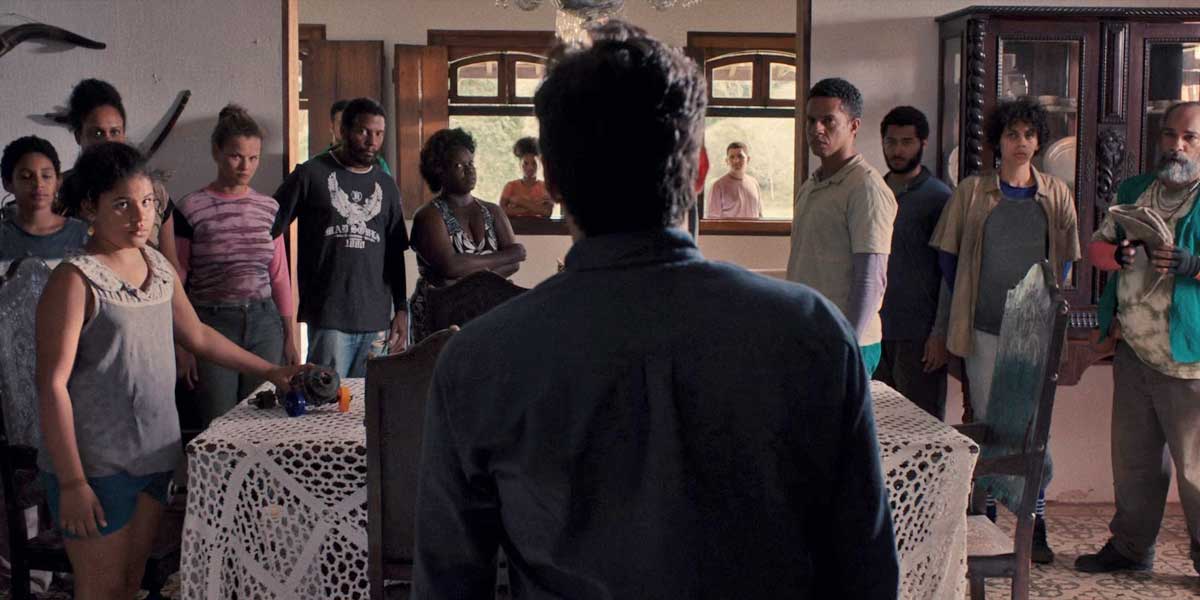Property is a relentless thriller that examines just how far people will go in order to protect themselves and those they love.
No matter how skilled you consider yourself at reading movies, any predictions you could possibly make during the first fifteen minutes of Property (Propriedade) will quickly be proven wrong. Daniel Bandeira’s hauntingly dark thriller constantly takes the most unpredictable and shocking path available in order to keep the audience on the edge of their seats and suffocate them with his gripping, relentless storytelling. The film follows a loving wife named Tereza (Malu Galli) who’s sent away to her husband’s farm in order to destress after a traumatic encounter left her unable to enjoy life. However, things quickly get out of control when she stumbles into a deadly conspiracy taking place on her family’s property.
What makes Property so much more gripping than other single-location thrillers is its dedication to tension; every single scene increases the stakes of the last, building upon the intensity that’s already been created until it becomes almost unbearable. And in the rare moments that it actually provides the audience with a moment to breathe, Property uses its astounding ensemble to dissect the social commentary that lies at the heart of the story. It’s this interpolation of genuine politics and purpose that makes Property so much more engaging than a regular thriller: it actually has something to say, exploring ideas of social injustice and classism in lesser-developed regions of the world.
Upon stripping back the surface-level narrative of Property’s hostage thriller, a much more profound story of revolution, injustice, and desperation is revealed. It stands gracefully in the shadow of projects such as Parasite and Bacurau (with which, interestingly, Property’s director of photography Pedro Sotero was also involved) hidden within the film, but it never feels like an imitation of either. It’s something authentic and new that places its own specific thoughts and ideas on display.

On a technical and formal level, Property is near-flawless. There isn’t a single check-your-watch moment in the entire film, clocking in at just under two hours of perfectly paced storytelling where every moment is vital and engaging. There isn’t a single wasted second in the entire story – and those scenes that might not feel important at first are the ones that ultimately come together to strengthen the message that audiences will be taking with them once the credits roll. Sotero’s cinematography is perfectly immersive, using a restrained balance of handheld and static cameras to create a uniquely intense atmosphere that’s maintained from start to finish. But the real behind-the-camera stars of Property are Caio and Nicolau Domingues, whose hauntingly visceral score is always lurking in the background, knowing exactly when to make itself known and capitalize on all that pent-up intensity.
It’s easy to dismiss thrillers as a simple genre that are purely made for entertainment value, but Property is one of those much-needed examples that proves just how unfair that judgement would be. The film transcends its own genre, staying true to everything that makes these kinds of movies so easy to watch (the fast pace, the simple plot, and the high-stakes storytelling) while maintaining a higher narrative that makes itself known at the same time. It’s the action and violence that grabs your attention right away, but it’s the more profound character work and ethical interrogations that will keep you locked into the story right until its shocking and harrowing conclusion.
Property premiered at the 2023 Edinburgh Film Festival in August. Read our list of films to watch at the 2023 Edinburgh Film Festival!

